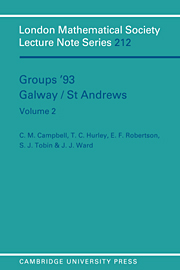Book contents
- Frontmatter
- Contents
- Preface
- Introduction
- An army of cohomology against residual finiteness
- On some questions concerning subnormally monomial groups
- A conjecture concerning the evaluation of products of class-sums of the symmetric group
- Automorphisms of Burnside rings
- On finite generation of unit groups for group rings
- Counting finite index subgroups
- The quantum double of a finite group and its role in conformal field theory
- Closure properties of supersoluble Fitting classes
- Groups acting on locally finite graphs - a survey of the infinitely ended case
- An invitation to computational group theory
- On subgroups, transversals and commutators
- Intervals in subgroup lattices of finite groups
- Amalgams of minimal local subgroups and sporadic simple groups
- Vanishing orbit sums in group algebras of p-groups
- From stable equivalences to Rickard equivalences for blocks with cyclic defect
- Factorizations in which the factors have relatively prime orders
- Some problems and results in the theory of pro-p groups
- On equations in finite groups and invariants of subgroups
- Group presentations where the relators are proper powers
- A condensing theorem
- Lie methods in group theory
- Some new results on arithmetical problems in the theory of finite groups
- Groups that admit partial power automorphisms
- Problems
Groups that admit partial power automorphisms
Published online by Cambridge University Press: 19 February 2010
- Frontmatter
- Contents
- Preface
- Introduction
- An army of cohomology against residual finiteness
- On some questions concerning subnormally monomial groups
- A conjecture concerning the evaluation of products of class-sums of the symmetric group
- Automorphisms of Burnside rings
- On finite generation of unit groups for group rings
- Counting finite index subgroups
- The quantum double of a finite group and its role in conformal field theory
- Closure properties of supersoluble Fitting classes
- Groups acting on locally finite graphs - a survey of the infinitely ended case
- An invitation to computational group theory
- On subgroups, transversals and commutators
- Intervals in subgroup lattices of finite groups
- Amalgams of minimal local subgroups and sporadic simple groups
- Vanishing orbit sums in group algebras of p-groups
- From stable equivalences to Rickard equivalences for blocks with cyclic defect
- Factorizations in which the factors have relatively prime orders
- Some problems and results in the theory of pro-p groups
- On equations in finite groups and invariants of subgroups
- Group presentations where the relators are proper powers
- A condensing theorem
- Lie methods in group theory
- Some new results on arithmetical problems in the theory of finite groups
- Groups that admit partial power automorphisms
- Problems
Summary
The influence of the existence of a group automorphism of a certain kind is the subject of much research. This paper will attempt to summarize one small corner of this research. We survey automorphisms that map most of the elements of a finite group to powers of themselves and the groups that support such automorphisms. The types of groups which have such automorphisms is limited in some cases, and in such cases, the proportion of elements taken to their powers can have only certain values.
The following notation will be used in this paper.
Z(G): The centre of the group G.
G′: The commutator subgroup of G.
Gp: The group generated by all of the pth powers of elements in G.
(g)φ: The image of the group element g under the automorphism φ.
|G : A|: The index of the subgroup A in the group G.
|T|: The number of elements in the set T.
Tn(φ) : {g ∈ G : (g)φ = gn} for an automorphism φ of G.
Lp: The set of all finite groups with order divisible by a prime p, but by no smaller prime.
It is well-known that if the map φ : x → x2 for all x ∈ G is an automorphism of the group G, then G is abelian and has odd order if it is finite. The existence of automorphisms of a group G of the form φ : x → x-1 or φ : x → x3 where G is finite also force G to be abelian.
- Type
- Chapter
- Information
- Groups '93 Galway/St Andrews , pp. 594 - 601Publisher: Cambridge University PressPrint publication year: 1995



